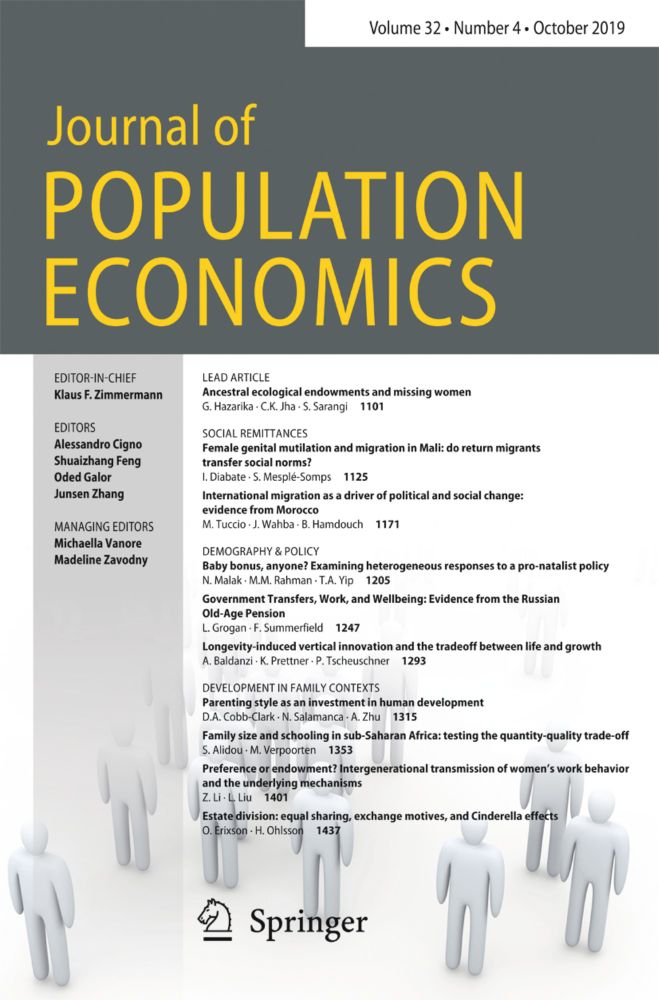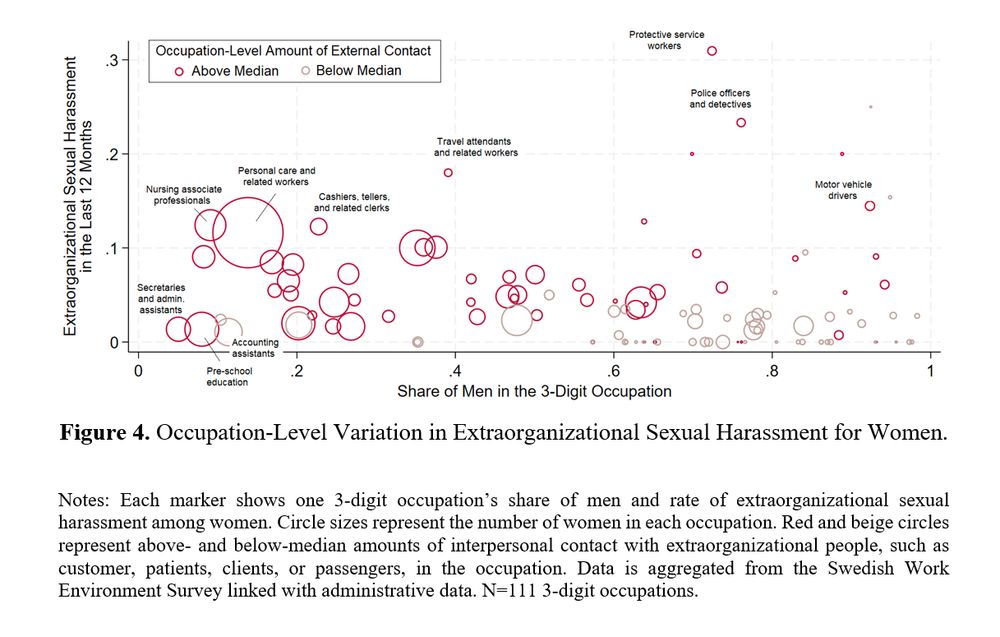
📚 📣 Are you in the Stockholm area on September 22nd? Come discuss new research about gender gaps in academia at Stockholm University! Email me to sign up. Program below!
03.09.2025 08:11 — 👍 49 🔁 19 💬 1 📌 1@johannarickne.bsky.social
Professor of Economics

📚 📣 Are you in the Stockholm area on September 22nd? Come discuss new research about gender gaps in academia at Stockholm University! Email me to sign up. Program below!
03.09.2025 08:11 — 👍 49 🔁 19 💬 1 📌 1Update #2, RETRACTED: 15 months after we (w @ollefolke.bsky.social and @johannarickne.bsky.social ) submitted the initial comment to the Journal, we've noticed the paper was ultimately retracted. Retraction note here: link.springer.com/article/10.1...
01.07.2025 06:21 — 👍 36 🔁 12 💬 2 📌 5
📣 Submit your paper to the Leibniz Open Science Day! I will be there to talk about our recent experience with replicating Ciacci (2024) about impacts of the Swedish legislation that banned sex purchases. Call for papers: www.zbw.eu/de/ueber-uns...
24.06.2025 17:04 — 👍 11 🔁 3 💬 1 📌 1Update: We submitted the comment to the Journal of Population Economics, and today we got a desk reject with this motivation. However, we do not know their conclusion about the main results and why the paper was not retracted. Clearly, they do not hold. 1/4
15.05.2025 17:41 — 👍 85 🔁 33 💬 6 📌 10They now say that we submitted in the wrong way, namely by emailing the editor (Zimmerman), which another co-editor told us to do. Nowhere did let us know that we should have submitted in the formal submission system instead. Either way, we are doing so with the new extended replication.
13.05.2025 06:59 — 👍 4 🔁 0 💬 1 📌 010/ Please help share our extended replication to correct the record on this misleading policy evaluation!
Full replication text here: www.econstor.eu/handle/10419...
9/ Based on our initial and extended replications, we wonder: how can the editor still trust the results of this paper? If this case does not meet the criteria for retraction, what does?
09.05.2025 09:29 — 👍 102 🔁 6 💬 3 📌 08/ Shockingly to us, most treatment effects are produced by implementing methods in the code that differ from those described in the paper. This practice seems super problematic because it will mislead reviewers and editors who expect the two to align.
09.05.2025 09:29 — 👍 79 🔁 3 💬 2 📌 27/ A series of errors create an illusion of statistically significant treatment effects of similar size in the five strategies. Examples include changing/adding/removing variables in regressions, using incorrect bandwidths, and changing clustering methods.
09.05.2025 09:29 — 👍 48 🔁 4 💬 1 📌 1
6/ We now look into not just one but all five identification strategies in the paper. The figure below summarizes these new results.
09.05.2025 09:29 — 👍 48 🔁 4 💬 3 📌 05/ The editor’s comment confirmed the coding error but failed to mention its impact on the paper’s results. The author concluded that the results were “not robust”. The journal did not post our comment, BUT the replication files allowed us to do the replication we wanted to do from the start.
09.05.2025 09:29 — 👍 50 🔁 7 💬 1 📌 0
4/ Twelve months after contacting the journal, it posted three things. A comment by the editor: doi.org/10.1007/s001...; A response by the author: doi.org/10.1007/s001...; And FINALLY, the (almost) complete replication package.
09.05.2025 09:29 — 👍 51 🔁 5 💬 4 📌 13/ Examining the methods and code revealed a coding error caused by trying to include fixed effects perfectly collinear with the treatment. Correcting this error showed no effect of the reform on rape. We sent this partial replication to the author and journal.
09.05.2025 09:29 — 👍 70 🔁 8 💬 1 📌 02/ We requested replication files from the author and the journal. After initially refusing to share any replication material, the author shared a partial do-file once we had collected the data ourselves and were not able to run the main regression described in the paper.
09.05.2025 09:29 — 👍 40 🔁 5 💬 2 📌 0
1/ The paper claimed that the reform caused a jump in rape by 50–60 percent. This seemed hard to reconcile with the flat time trend in reported rapes around the time of the reform.
09.05.2025 09:29 — 👍 48 🔁 7 💬 2 📌 2🚨 REPLICATION REPORT UPDATE: One year ago, a tweet by John Holbein alerted me, @ollefolke.bsky.social, and @jopieboy.bsky.social to a paper with a shocking result about Sweden’s law criminalizing the purchase of sex.🧵
09.05.2025 09:29 — 👍 388 🔁 199 💬 7 📌 30See our Open-Access paper in @electoralstudies.bsky.social for more information: www.sciencedirect.com/science/arti...
Please help share with colleagues or students who might find this resource useful! 🌷🌷🌷
The database is now available on Dataverse doi.org/10.7910/DVN/...
We follow the official method of the Swedish government to code party families. The database includes the raw data from the statistical reports so that users can study more fine-grained local variation. 6/
A geographic id-code tracks territories over time. Two large mergers reduced the number of municipalities from over 2,500 to 290. This code also allows matching our political data with other historical Swedish datasets on economy, demography, and social movements. 5/
16.04.2025 14:06 — 👍 1 🔁 0 💬 1 📌 0
The data lets researchers explore long-term trends in political representation, including how women gained ground in local politics well before gender quotas. Here's a figure showing striking local variation in women’s representation. 4/
16.04.2025 14:06 — 👍 1 🔁 0 💬 1 📌 0This is the first database of its kind in Sweden with consistent party-family classifications, gender breakdowns, and full historical continuity from the early days of democracy to the present. So what can you use it for? 3/
16.04.2025 14:06 — 👍 1 🔁 0 💬 1 📌 0Swedish local councils historically submitted detailed election statistics to the national government. By hand-coding these archival forms, we recovered gender-by-party family data for each elected council across 29 election waves. 2/
16.04.2025 14:06 — 👍 2 🔁 0 💬 1 📌 0
We’re excited to introduce the Swedish Municipal Council Database! This open-access resource contains our hand-coded data for all local politicians in Sweden's democratic local elections between 1919 and 2018. A 🧵
Co-authors 🤩 @abrarbawati.bsky.social, @josefinemagnusson.bsky.social Moa Frödin

A study of the consequences of revolving door laws for political selection in US state legislatures, from Raymond Fisman, Jetson Leder-Luis, Catherine M. O'Donnell, and Silvia Vannutelli https://www.nber.org/papers/w33626
05.04.2025 13:00 — 👍 14 🔁 6 💬 0 📌 1Why does this study matter?
Because prevention strategies need to be targeted to the source. Sexual harassment from colleagues and managers requires different prevention strategies than sexual harassment from outside groups.
8/

Another striking finding:
Male-dominated jobs with high outsider contact are rare and differ from the overall pattern. Women in these male-stereotyped roles, like security guards or police, face high risks of sexual harassment from both insiders and outsiders (the latter shown in the figure).
7/
One insight that stood out:
Men in female-dominated, high-contact roles face a double exposure—more harassment from colleagues and from outsiders.
This group is often overlooked in both public discussion and policy responses.
6/

Similarly, jobs with frequent interaction with the public—especially those in care, health, and service sectors—see significantly more extraorganizational harassment.
These jobs are mostly held by women.
The level of contact with outsiders is predictive of risk.
5/

If you are a woman in a male-dominated job (e.g., engineering, policing), or a man in a female-dominated one (e.g., nursing, care work), you are more likely to be surrounded by opposite-sex colleagues—and at greater risk of intraorganizational harassment.
4/
Here’s the pattern we found:
• Workers face more harassment from colleagues when they are gender minorities in their occupation
• Workers face more harassment from outsiders in women-dominated, high-contact jobs
The common denominator? Interpersonal contact.
3/